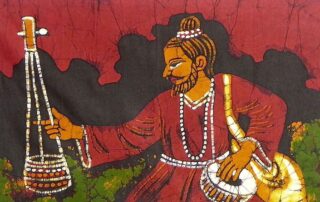Bāula Saṅgīta Song 2
Bāula Saṅgīta Song 2 (1) dharma-pathe thāki’ kara jīvana jāpana, bhāi hari-nāma kara sadā (ore o bhāi) hari vinā bandhu nāi O brothers! Just pass your lives by staying on the path of dharma. Always chant hari-nāma (O brothers!), for without Hari, you have no friend. (2) ye kona vyavasā dhari’, jīvana nirvāha kari’ bala mukhe hari hari, ei mātra bhikṣā cāi Whatever livelihood you accept to maintain your life, fill your mouths with the chanting of “Hari! Hari!”— this is the only request I beg. (3) gaurāṅga-caraṇe maja, anya abhilāṣa-tyaja vrajendra-nandane bhaja, tabe baḍa Read More...
Bāula Saṅgīta Song 1
Bāula Saṅgīta Song 1 (1) āmi tomāra duḥkher duḥkhī sukher sukhī tāi tomāre bali bhāi re nitāi-er hāṭe giye (ore o bhāi) nāma enechi tomāra tare I am sad when you are sad, and I am happy when you are happy. O brothers! I sincerely tell you this! Having gone to Nitāi’s market-place (O brothers), I have brought the holy names just for you. (2) gaura-candra-mārkā karā, e hari-nāma rase bharā paḍche dharā, lao yadi vadana bhore Marked with the sign of Gaura-candra, this hari-nāma is filled with rasa. You can take it, if Read More...
Bāula Saṅgīta Introduction
Bāula Saṅgīta Introduction This collection of 12 Bengali songs was composed in 1893. The Bāulas are a group of pseudo-Vaiṣṇavas who roam the countryside of Bengal singing songs, playing an ektar (a one-stringed instrument). The gaiety of the Bāulas and their down to earth village songs had a strong influence upon the educated classes of Bengal, and in particular with the famous Bengali poet Rabindranatha Tagore, who popularised them. The beliefs of the Bāulas are a mix of Gauḍīya Vaiṣṇavism, Sufi Islam and impersonalism, thus they are actually opposed to the pure teachings of Śrī Read More...









